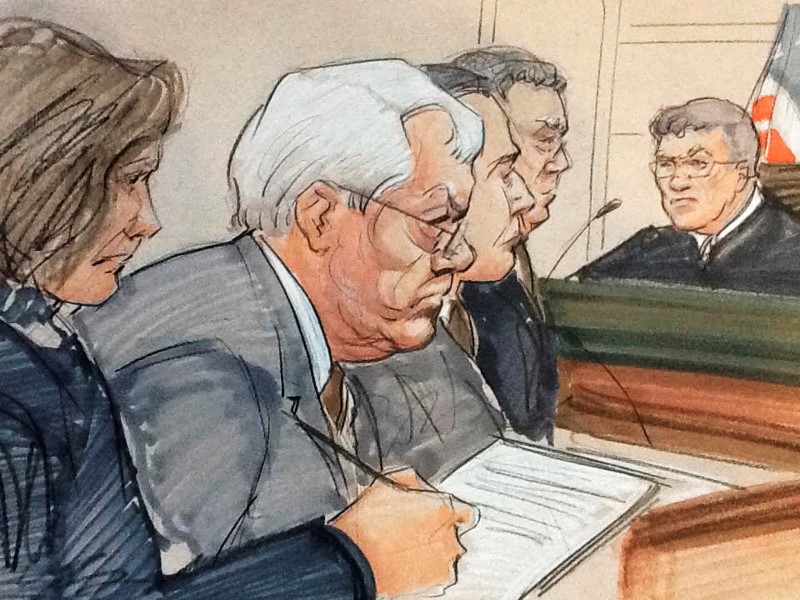By Mary Wisniewski and Fiona Ortiz
(Reuters) - Former U.S. House Speaker Dennis Hastert pleaded guilty on Wednesday to a federal financial crime in a hush-money case stemming from allegations of sexual misconduct, marking the dramatic downfall of a once powerful politician.
In exchange for the guilty plea, federal prosecutors recommended a sentence of zero to six months imprisonment, although the judge could sentence Hastert to up to five years in prison and fine him $250,000.
Hastert, 73, pleaded guilty to one count of "structuring" - withdrawing funds from bank accounts in amounts below $10,000 to evade bank reporting rules on large cash movements. Those rules exist to detect money laundering.
Hastert, a Republican who led the House of Representatives from 1999 to 2007, told U.S. District Judge Thomas Durkin that he knew that what he was doing was wrong.
"I didn't want them to know how I intended to spend the money," he said, reading from a brief statement during a hearing in the federal courthouse in Chicago that lasted a little over 20 minutes.
In the agreement, Hastert admitted to paying $1.7 million in cash to someone he had known for decades to buy that person's silence and compensate for past misconduct toward that individual.
Prosecutors did not spell out what the misconduct was, but unnamed law enforcement officials have told media that it was sexual and involved someone Hastert knew when he was a high school teacher and coach in his hometown of Yorkville, Illinois in the 1960s and 1970s.
Hastert, flanked by two attorneys, stood before the judge and answered a series of questions to indicate that he understood what he was doing. He spoke loudly and clearly at the judge's request.
His lawyers will likely not call witnesses at his sentencing hearing, to avoid opening the door to potentially embarrassing information from his past, according to a defense attorney who has handled similar cases.
"I think it's a really good outcome, from a defense perspective," said Amy Richardson, with the firm of Harris, Wiltshire & Grannis.
MULTIPLE PAYMENTS
A separate charge of lying to the FBI was dismissed.
Hastert, stooped, white-haired and wearing a gray suit with a blue tie, remains free on bond pending a sentencing hearing on Feb. 29.
Hastert and his lawyers left the courthouse and declined to comment to reporters. The former speaker has not spoken publicly since his indictment in May.
In the plea agreement Hastert admitted that he reached an agreement in 2010 with the individual who was a victim of his misconduct, to pay a total of $3.5 million in hush money.
From 2010-2012 Hastert made 15 withdrawals of $50,000 each from a number of banks, meeting with the individual every few months to pay the person an installment.
In April 2012, bank employees asked Hastert for an explanation of the withdrawals and told him they had to report large transactions. After that, he started to withdraw in lower increments. From mid-2012 until late 2014 he made 106 withdrawals of amounts under $10,000 while he kept paying the unnamed individual every few months, according to the plea agreement.
In December 2014, agents from the Federal Bureau of Investigation asked Hastert about the withdrawals and he said he was keeping the cash, intentionally concealing the payments to the individual, according to the plea agreement.
If there were any sex abuse it would not lead to criminal charges because the statute of limitations ran out long ago.

"This is one more time where a person with power and authority gets to keep dirty secrets hidden," said Barbara Blaine, founder of SNAP, an advocacy group for survivors of clerical abuse.
Hastert was the longest-serving Republican speaker in the history of the House. He left Congress in 2007 and became a lobbyist and consultant.
After his indictment, Hastert resigned from the Dickstein Shapiro lobbying firm in Washington, D.C., and from the boards of exchange operator CME Group Inc (O:CME) and REX American Resources Corp (N:REX).